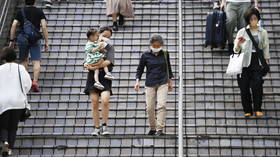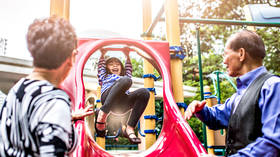PM’s aide warns Japan could 'disappear’

Japan faces existential issues if its extremely low birthrate issue is left unaddressed, according to Masako Mori, an aide to Prime Minister Fumio Kishida. Mori, an upper house lawmaker and former minister, advises the PM on problems surrounding national fertility rates as well as on LGBTQ issues.
The official made the remarks in an interview shortly after the country’s Ministry of Health announced yearly statistics on deaths and birth rates, painting a rather grim picture. Twice as many people died as were born in the country, with 799,728 births registered compared to 1.58 million deaths.
"If we go on like this, the country will disappear. It’s the people who have to live through the process of disappearance who will face enormous harm. It's a terrible disease that will afflict those children," Mori stated.
The figures continue Japan’s decade-long trend of population decline, though the birthrate figure fell below the 800,000 mark for the first time in 2022. Japan’s population continued to age as well, with the median age reported at 49 years. The number of people over 65 years of age reached over 29%, making Japan the second country in the world with the oldest population, beaten only by the European microstate of Monaco.
If the negative trend continues, Japan risks a complete breakdown of its society, Mori said, adding that the birthrate situation gets more and more alarming every year. "It’s not falling gradually, it’s heading straight down," she said.
"It’s the people who have to live through the process of disappearance who will face enormous harm. It’s a terrible disease that will afflict those children," Mori stated. "If nothing’s done, the social security system would collapse, industrial and economic strength would decline, and there wouldn’t be enough recruits for the Self-Defense Forces to protect the country."
The alarmist remarks echoed the statements made by Mori’s boss in late February. Back then, Kishida described the birthrate situation as an urgent risk to Japanese society, pledging more spending to stimulate childbirth, increasing children's allowances being a key measure.
"Japan is standing on the verge of whether we can continue to function as a society," he said at the time. "Focusing attention on policies regarding children and childrearing is an issue that cannot wait and cannot be postponed."













